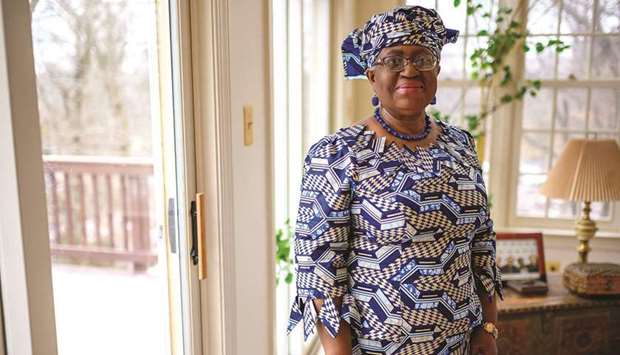Three months after the Trump administration rejected her, former Nigerian finance minister Ngozi Okonjo-Iweala received unanimous backing yesterday to become the first woman and first African director-general of the World Trade Organisation.
A self-declared “doer” with a track record of taking on seemingly intractable problems, Okonjo-Iweala will have her work cut out for her at the trade body, even with Donald Trump, who had threatened to pull the United States out of the organisation, no longer in the White House.
As director-general, a position that wields limited formal power, Okonjo-Iweala, 66, will need to broker international trade talks in the face of persistent US-China conflict; respond to pressure to reform trade rules; and counter protectionism heightened by the Covid-19 pandemic. In her acceptance speech at the WTO, she said that getting a trade deal at the next major ministerial meeting would be a “top priority” and also urged members to reject vaccine nationalism, according to a delegate attending the closed meeting, which was held virtually.
In the same speech, she described the challenges facing the body as “numerous and tricky but not insurmountable”. She is set to begin work on March 1. The US delegate said that Washington was committed to working closely with her and would be a “constructive partner” while China’s delegate pledged “full support” for her. EU trade commissioner Valdis Dombrovskis said he looked forward to working closely with her to drive “much-needed reform of the institution”.
A 25-year veteran of the World Bank, where she oversaw an $81bn portfolio, Okonjo-Iweala ran against seven other candidates by espousing a belief in trade’s ability to lift people out of poverty. She studied development economics at Harvard after experiencing civil war in Nigeria as a teenager. She returned to the country in 2003 to serve as finance minister and backers point to her hard-nose negotiating skills that helped seal a deal to cancel billions of dollars of Nigerian debt with the Paris Club of creditor nations in 2005.
“She brings stature, she brings experience, a network and a temperament of trying to get things done, which is quite a welcome lot in my view,” former WTO chief Pascal Lamy told Reuters last week. “I think she’s a good choice.” Key to her success will be her ability to operate in the centre of a “US-EU-China triangle”, he said. The endorsement of the Biden administration cleared the last obstacle to her appointment. Okonjo-Iweala becomes one of the few female heads of a major multilateral body. When she joins the WTO’s Geneva lakeside headquarters her portrait is set to be hung beside others of men, mostly white and from rich countries.
The Trump administration’s main criticism of her was that she lacked direct trade experience compared to her main South Korean rival and even supporters say she will have to quickly get up to speed on the technicalities of trade negotiations. She has rejected this, saying that she has plenty of experience of trade plus other expertise. “The qualities I have are even better,” she said.
Raised by academics, the mother-of-four earned a reputation for hard work and modesty amid the pomp of Nigeria’s governing class, acquaintances say.
“She is persistent and stubborn,” said Kingsley Moghalu, former deputy governor of Nigeria’s central bank who worked with her when she was the country’s first female finance minister. Nigeria’s President Muhammadu Buhari welcomed her election, saying it brought “more joy and honour to the country’
Her appointment also was welcomed by people in the streets of Nigeria’s capital Abuja where Ibe Joy, who works in marketing, said Okonjo-Iweala’s achievements were an inspiration to young women. “If she can do it we all can do it,” said Joy.
The 26-year-old WTO that Okonjo-Iweala inherits after a six-month leadership gap is partially paralysed, thanks to the Trump administration which blocked appointments to its top appeals body that acts as the global arbiter of trade disputes. But even before Trump, negotiators had struggled to clinch deals that must be agreed by consensus, with the United States and other developed WTO members arguing that developing countries, notably China, cannot cling on to exceptions and that rules need to change to reflect China’s economic growth.
Okonjo-Iweala, who is a special envoy for the World Health Organisation on Covid-19 and, until recently chair of the board of global vaccine alliance Gavi, has told Reuters that trade’s contribution to public health would be a priority.
WHO Director-General Tedros Adhanom Ghebreyesus called Okonjo-Iweala the “WTO’s perfect chief”. The WTO currently faces deadlock over an issue of waiving intellectual property rights for Covid-19 drugs, with many wealthy countries opposed.
High on the to-do list will also be fisheries subsidies, the subject of the WTO’s main multilateral talks that missed a deadline to conclude by end-2020. Asked about the challenges ahead, she joked that a book she wrote about fixing Nigeria’s broken institutions could well apply to today’s WTO: Reforming the Unreformable.
“I feel I can solve the problems. I’m a known reformer, not someone who talks about it,” she told Reuters in an earlier interview. “I’ve actually done it”.

Nigeria’s Ngozi Okonjo-Iweala poses at her home in Potomac, Maryland, near Washington DC, as she was confirmed as the first woman and first African leader of the beleaguered World Trade Organisation yesterday.
